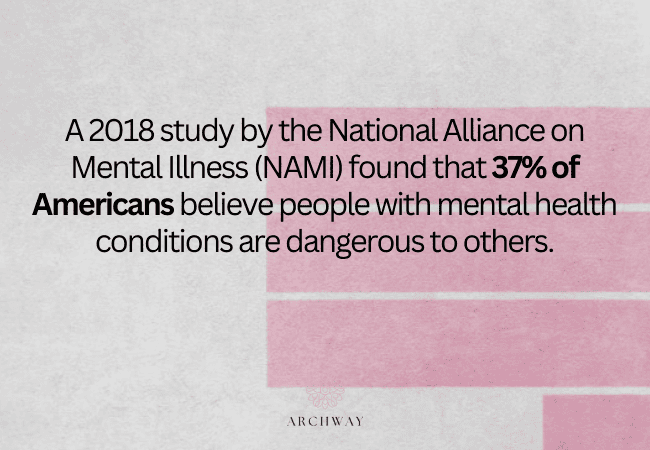Mental health stigma is a significant barrier that prevents countless individuals from seeking the help they need. It often manifests as negative attitudes, prejudices, and discrimination, which can make those who are struggling with mental health conditions feel isolated, ashamed, or reluctant to reach out for support. At Archway Behavioral Health, we are committed to dismantling these misconceptions and providing a compassionate environment where individuals can focus on their recovery without fear of judgment. In this article, we will explore what stigma in mental health is, its impact, and how it can be overcome through treatment and support.
What Is Mental Health Stigma?
Mental health stigma refers to the negative societal attitudes and misconceptions about people who have mental health conditions. These biases can be harmful and can take different forms:
- Social stigma: Publicly held beliefs or attitudes that portray those with mental health issues as weak, incapable, or unpredictable. These stereotypes are often perpetuated by media, cultural myths, and general misinformation about mental health.
- Self-stigma: This happens when individuals internalize these negative perceptions, leading them to feel shame, guilt, or unworthy of care and treatment. Self-stigma can create a cycle of self-doubt, making it harder for individuals to seek help.
- Structural stigma: This involves policies, laws, or organizational practices that discriminate against those with mental health issues. Structural stigma may limit access to resources and support, further isolating individuals from the care they need.
The Impact of Mental Health Stigma
Mental health stigma can be incredibly damaging, both emotionally and physically. It can prevent individuals from reaching out for help, thereby delaying or hindering their recovery. The negative effects of stigma include:
- Increased Feelings of Shame and Isolation: When people fear being judged or misunderstood due to their mental health struggles, they may withdraw from social interactions. This can lead to increased loneliness, isolation, and feelings of helplessness, all of which can exacerbate existing mental health conditions.
- Reluctance to Seek Treatment: Many individuals experiencing mental health issues avoid seeking help out of fear of being labeled or stigmatized. This reluctance can prevent individuals from participating in treatment programs such as Individual Therapy, Group Therapy, Partial Hospitalization Programs (PHP), or Intensive Outpatient Programs (IOP)—which can be life-saving.
- Worsened Symptoms: Research has shown that people who face mental health stigma tend to experience more severe symptoms. When stigma prevents individuals from accessing treatment, mental health disorders such as depression, anxiety, and PTSD can worsen, making recovery more difficult.
- Barriers to Employment and Housing: Structural stigma can manifest in ways that affect people’s ability to find work or stable housing. For example, discrimination in the workplace or housing markets based on a history of mental health struggles can create additional stressors, further undermining recovery efforts.
- Lower Quality of Life: The constant pressure to hide one’s mental health condition due to stigma can diminish an individual’s quality of life. It can affect personal relationships, job performance, and overall emotional well-being.
Overcoming Mental Health Stigma
Overcoming mental health stigma is a critical part of the recovery process. At Archway Behavioral Health, we believe that addressing stigma requires a multi-faceted approach, including education, empowerment, and creating safe spaces for healing. Below are some key ways to combat mental health stigma and support recovery:
1. Education and Awareness
One of the most effective ways to break down stigma is by educating the public about mental health. By dispelling myths and raising awareness about the reality of mental health conditions, we can shift attitudes and perceptions. At Archway, we are committed to providing resources, such as workshops and informational content, that highlight the importance of mental health care and recovery.
Additionally, we encourage individuals to share their experiences openly, as personal stories are powerful tools in changing perceptions. The more people talk about mental health, the more normalized it becomes, and the less stigma surrounds it.
2. Creating a Supportive and Compassionate Environment
At Archway Behavioral Health, we prioritize creating a safe, compassionate, and nonjudgmental environment for all of our clients. Whether through Individual Therapy or Group Therapy, we ensure that every person who walks through our doors feels valued, heard, and supported. Our goal is to provide a space where clients can openly discuss their mental health challenges and work toward recovery without fear of judgment or rejection.
Our therapists and counselors are specially trained to work with individuals dealing with stigma-related concerns, providing them with the tools to cope and heal in a supportive environment.
3. Empowering Individuals Through Therapy
Therapies like DBT Therapy Florida and CBT Therapy Florida are essential for building emotional resilience and empowering individuals to manage their mental health conditions. Dialectical Behavior Therapy (DBT) focuses on helping individuals regulate emotions, improve interpersonal relationships, and develop mindfulness skills—key components in overcoming stigma. Cognitive Behavioral Therapy (CBT) works by helping individuals identify and change negative thought patterns that can reinforce self-stigma.
Both DBT and CBT are highly effective in challenging the destructive thoughts and feelings associated with mental health stigma, helping clients regain confidence in themselves and their recovery journey.
4. Support Through Structured Treatment Programs
Our Partial Hospitalization Program (PHP) and Intensive Outpatient Program (IOP) are designed to provide intensive care while allowing clients to maintain a level of independence. These programs offer a structured and supportive environment, combining therapy, counseling, and skill-building exercises to help clients develop healthier coping mechanisms and increase self-awareness.
These treatment options help break the cycle of stigma by focusing on individual needs and promoting personal growth, ensuring that clients receive the care and support they need to succeed in their recovery.
5. Fostering a Community of Hope and Acceptance
Finally, at Archway Behavioral Health, we encourage the development of a supportive community of individuals who understand and share the challenges of mental health recovery. Our Group Therapy sessions are an essential part of this process, allowing clients to connect with others who are facing similar struggles. The bonds formed in group therapy are vital for reinforcing feelings of acceptance and belonging, reducing the isolation often caused by stigma.
The Path to Recovery: A Journey of Strength
The journey to mental health recovery is unique for each person, and it can be challenging to overcome the effects of stigma along the way. However, with the right support, therapy, and resources, recovery is possible. At Archway Behavioral Health, we are dedicated to creating an environment where stigma is not a barrier to healing but a challenge to be overcome with compassion, support, and understanding.
If you or someone you know is struggling with mental health issues and is ready to take the next step in their recovery, we encourage you to reach out. Our Mental Health Treatment Programs, including DBT Therapy Florida, CBT Therapy Florida, Partial Hospitalization Program, and Intensive Outpatient Program, are here to guide you through the process in a supportive, stigma-free environment.
Final Thoughts
Overcoming stigma is an essential step in the journey toward mental health recovery. At Archway Behavioral Health, we believe that everyone deserves the opportunity to heal in a safe, supportive, and empowering environment. Whether through therapy, community support, or self-empowerment, recovery is possible, and we are here to help you every step of the way. Let us guide you toward a healthier, stigma-free future. Take the step toward reclaiming your life and health—contact us at (888) 488-4103



